

How To Search Free Ebooks Independently Like A Search Engine. How To Search Free Ebooks Independently Like A Search Engine Ideally, the first step that you need to take is to identify the status of the ebook title that you’re searching for – to identify whether it’s free or not.
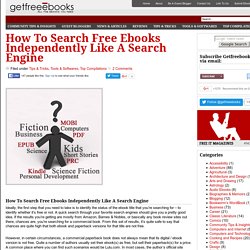
A quick search through your favorite search engines should give you a pretty good idea. If the results you’re getting are mostly from Amazon, Barnes & Nobles, or basically any book review sites out there, chances are, you’re searching for a commercial book. From this set of results, it’s quite safe to say that chances are quite high that both ebook and paperback versions for that title are not free. 30+ Accessibility Tools, Softwares & Resources for the Visually Impaired. Free ebooks are meant to be read and enjoyed by everybody regardless of physical imperfections, hence why this post is being made, although I must admit that this should be the first post that should be posted here.

Having said that, do join me in the journey to increase this list of resources to make it a comprehensive one, to provide and create the proper accessibility channels. I’m sure there are other list out there which covers some of the areas below, but I do hope this post will somehow be a part of the whole effort in making this a reality. Audio Ebooks Been covered here, 35 total sites found so far providing free downloadable audio ebooks. Rejectamentalist manifesto. Against Reviews. The office of a reviewer is, in a republic of letters, as beneficial and necessary, though as odious and unpleasant, as that of an executioner in a civil state.
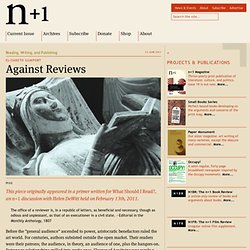
—Editorial in the Monthly Anthology, 1807 Before the “general audience” ascended to power, aristocratic benefactors ruled the art world. We Can't Teach Students to Love Reading. By Alan Jacobs While virtually anyone who wants to do so can train his or her brain to the habits of long-form reading, in any given culture, few people will want to.
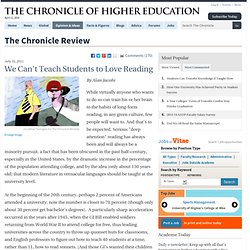
And that's to be expected. Serious "deep attention" reading has always been and will always be a minority pursuit, a fact that has been obscured in the past half-century, especially in the United States, by the dramatic increase in the percentage of the population attending college, and by the idea (only about 150 years old) that modern literature in vernacular languages should be taught at the university level. Aldous Huxley's Psychedelic Los Angeles Life. Aldous Huxley is best remembered for his dystopian novel "Brave New World," depicting a future conformist society in which happiness is mandated and medicated.
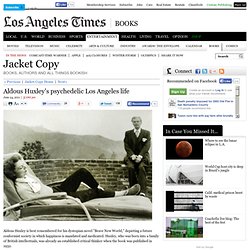
Huxley, who was born into a family of British intellectuals, was already an established critical thinker when the book was published in 1932. So he might seem like an unlikely candidate for going to the Southern California desert to take a hallucinogen like mescaline -- but that's exactly what he did. Huxley's Southern California adventures were the subject of a sold-out discussion this week at the LA Public Library's ALOUD series; as hundreds took their seats, more than 40 people waited fruitlessly in the standby line. The Creepy Nathaniel Hawthorne Story Edgar Allan Poe Loved. Nathaniel Hawthorne is best remembered today for his moralistic novel "The Scarlet Letter.
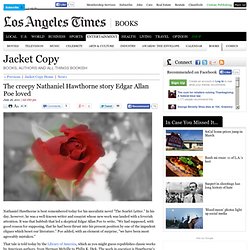
" In his day, however, he was a well-known writer and essayist whose new work was lauded with a feverish attention. It was that hubbub that led a skeptical Edgar Allan Poe to write, "We had supposed, with good reason for supposing, that he had been thrust into his present position by one of the impudent cliques which beset our literature. " Poe added, with an element of surprise, "we have been most agreeably mistaken. " That tale is told today by the Library of America, which as you might guess republishes classic works by American authors, from Herman Melville to Philip K.
Dick. Brave New World Revisited (1958) by Aldous Huxley. Contents Foreword I Over-PopulationII Quantity, Quality, Morality III Over-Organization IV Propaganda in a Democratic Society V Propaganda Under a Dictatorship VI The Arts of Selling VII Brainwashing VIII Chemical Persuasion IX Subconscious Persuasion X Hypnopaedia XI Education for Freedom XII What Can Be Done?
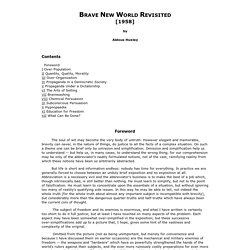
Foreword The soul of wit may become the very body of untruth. However elegant and memorable, brevity can never, in the nature of things, do justice to all the facts of a complex situation. Death Be Not Allowed. Virginia Woolf’s Late Essays. Fantastic BBC Footage of JRR Tolkien In 1968. The high points of this documentary on the great J.R.R.
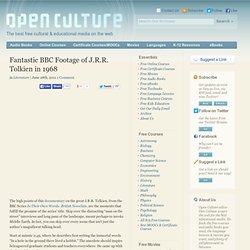
Tolkien, from the BBC Series In Their Own Words: British Novelists, are the moments that fulfill the promise of the series’ title. Skip over the distracting “man on the street” interviews and long pans of the landscape, meant perhaps to invoke Middle Earth. In fact, you can skip over every scene that isn’t just the author’s magnificent talking head. Start at minute 2:49, where he describes first writing the immortal words “In a hole in the ground there lived a hobbit.” The anecdote should inspire beleaguered graduate students and teachers everywhere: He came up with the line while grading exams. When Kerouac Met Dostoyevsky.
By Stephen J.
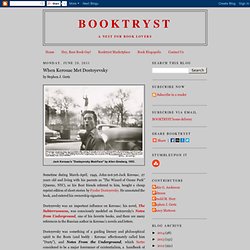
Gertz Sometime during March-April, 1949, John-not-yet-Jack Kerouac, 27 years old and living with his parents as "The Wizard of Ozone Park" (Queens, NYC), as his Beat friends referred to him, bought a cheap reprint edition of short stories by Fyodor Dostoyevsky. He annotated the book, and entered his ownership signature. The Decline of the Pseudonym. At its most basic level, a pseudonym is a prank.
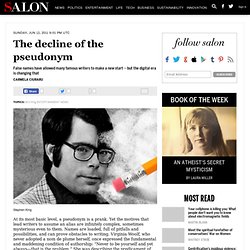
Yet the motives that lead writers to assume an alias are infinitely complex, sometimes mysterious even to them. Names are loaded, full of pitfalls and possibilities, and can prove obstacles to writing. When Bad People Write Great Books. A reader, prompted by last week’s commentary on whether great books can make you a better person, wrote in to ask a related question. Her favorite author is Charles Dickens; his books have been beacons for her. While she’d like to know more about him, she recalls reading long ago that Dickens behaved badly in his personal life. A New Yorker blindfold Test. Recently, the jazz musician Ethan Iverson interviewed the crime writer Lawrence Block on his blog, and gave him a mystery-novel “blindfold test.” As Iverson explained to Block, the blindfold test is a jazz pastime, popularized in Downbeat magazine, in which snippets of songs are played for famous musicians, who must guess the artists performing the songs.
Here, for instance, is a passage from a blindfold test given by Downbeat to Miles Davis in 1964, in which he responds to a recording of the song “Mary Ann,” composed and played by Eric Dolphy: I got such a kick out of Iverson’s interview that I thought we should play our own little version here on the Book Bench. Of course, a New Yorker blindfold test poses certain difficulties not present in a mystery-novel blindfold test, namely the not-so-small matter of our house style. But, as Yagoda notes of his test, the Times also has a house style, which, though strict, nevertheless allows individual writers’ voices to shine through.
Novel Approach: Reading Courses As An Alternative To Prison. With one of the highest incarceration rates in the world, and the death penalty, the US state of Texas seems the last place to embrace a liberal-minded alternative to prison. But when Mitchell Rouse was convicted of two drug offences in Houston, the former x-ray technician who faced a 60-year prison sentence – reduced to 30 years if he pleaded guilty – was instead put on probation and sentenced to read. "I was doing it because it was a condition of my probation and it would reduce my community hours," Rouse recalls. The 42-year-old had turned to drugs as a way of coping with the stress of his job at a hospital where he frequently worked an 80-hour week.